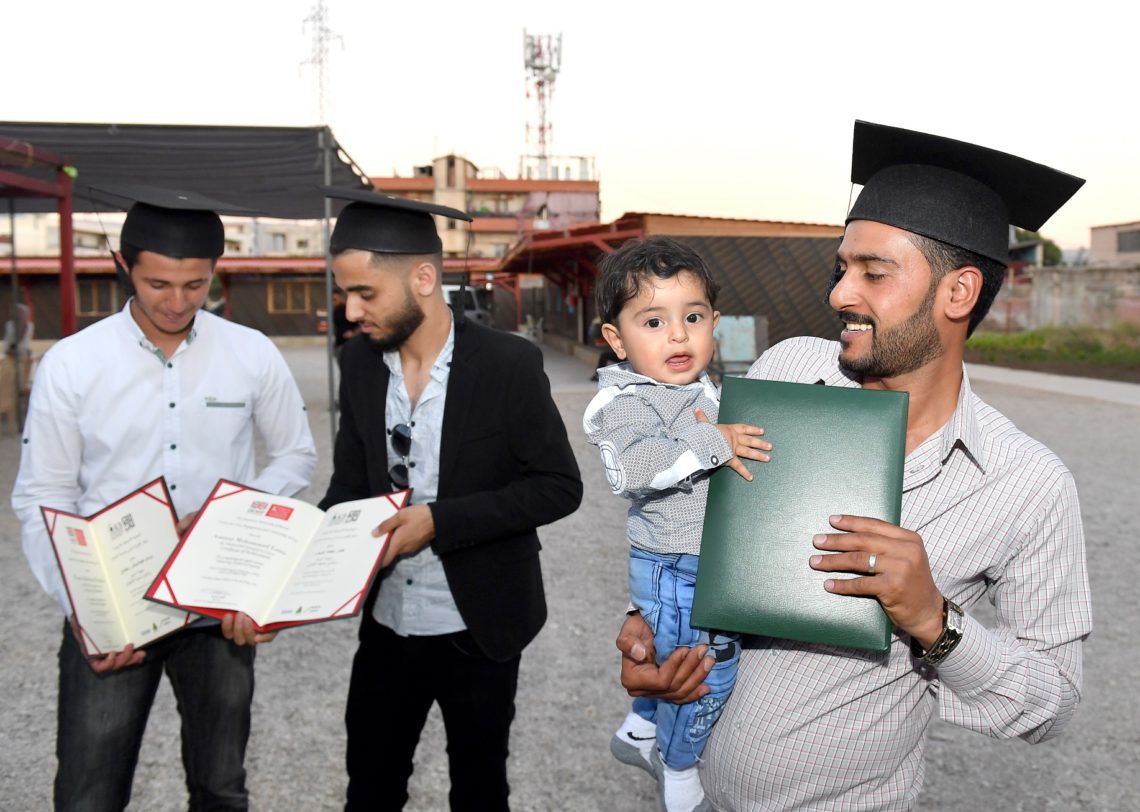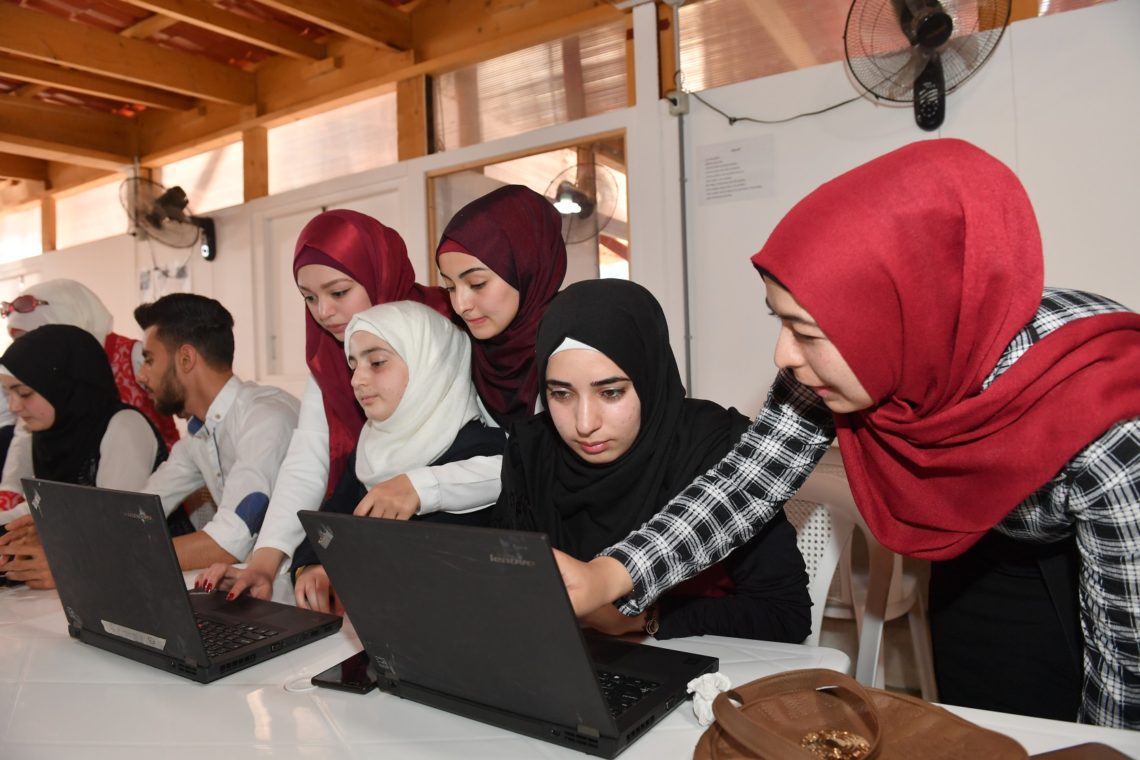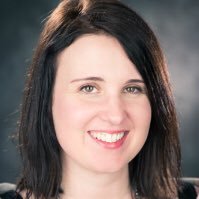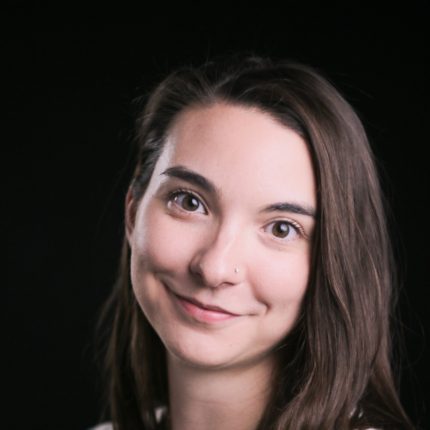After seven years of conflict and mass displacement, a large portion of the Syrian population has lost access to education. There is a desperate need to bridge the gap between pre- and post-18 education, and address the accompanying skills shortage that entails.
Kings College London’s commitment to service has been at the forefront of our recent series of online and blended courses for Syrian refugees, and disadvantaged host-community students in Jordan and Lebanon. Kings is the lead partner of a major education grant from the UK’s Department for International Development. The project: Partnership for Digital Learning and Increased Access (PADILEIA) is driven by an international consortium comprising five partners – American University Beirut (AUB), Al al-Bayt University (AABU), Kiron Open Education, and FutureLearn – which are working together to increase access to HE and improve the career prospects of young adults in the region.
Visiting refugee camps in Jordan and temporary settlements in the Bekaa region of Lebanon, meeting young people desperate to continue their education, and seeing for ourselves the challenge of living and studying as a refugee, brought home the very real challenges facing us in achieving successful educational outcomes for these students. Despite this, we also saw that all teenagers, bored or not, hang out with friends, play football and meet up for coffee.

Learning in refugee camps
The key challenges in delivering online education in this situation include: low computer literacy; little familiarity with online learning or recognition of its value; limited access to wireless and internet connectivity; and low levels of ownership of laptops or other devices. Not easy for an education innovation team used to operating in a hyper-connected world. However, our team of experts includes learning designers, developers, artists and project managers making them well placed to navigate some of these issues.
Our task is to develop 12 massive open online courses (MOOCs) created specifically for these learners, and design the online components of a blended foundation certificate course, running in two locations in Lebanon and Jordan in partnership with AUB and AABU. Our first two MOOCs were basic English courses which introduced students to learning fully online and independently. Much of the content was informed by speaking to non-governmental organisations in the region, and to teachers and students on the foundation courses which launched prior to the MOOCs.
Our number one priority across all King’s Online projects is always learner-centred design – in this case it was critical to engage these students and through this raise the profile of online education in the region. Central to this aspiration were three considerations: accessibility, usefulness, and relevance. Early on it was clear that we would not be able to design courses which relied upon good connectivity as this varied significantly depending on location and living conditions. We discounted video as a primary teaching tool for the first MOOCs, although we may revisit it as we learn more. We did not want this to impact on the engagement and enjoyability of the course, so we needed to find other ways to engage learners.
Telling their own story
We decided to take a storytelling approach, creating fun and relatable characters who would guide the learners through the different educational activities. Despite our initial concerns about engaging with personal topics and narratives, we found that students really wanted the vocabulary and skills to be able to explain their experiences and tell their own story to the wider world. These students wanted to learn English for their own careers and educational prospects – but also so they had a voice. We decided that content should not be Westernised, but should fit into the context and culture of the refugees.

With any language learning, practice is key. We had a group of nine Kings student volunteers who each supported a group of three learners through the learning process and assessment component. These students were identified as particularly interested in receiving additional support via WhatsApp. We chose WhatsApp because the majority of our learners have basic smartphones and intermittent internet connections and WhatsApp is the best tool for low connectivity. Many of these learners, although young, had children of their own and through the use of WhatsApp could take language learning into their own home – learning flexibly and in their own time. Some of the young women in particular were keen on passing their own language learning to their children, and to develop peer support networks that could continue after the programme ended.
We all learned a great deal from the first two MOOCs, and this will influence the design and development of the next ten courses. We need to continue to pay attention to the fact that refugees are not used to self-directed learning and that they need language that is relevant for their specific situation. Cultural differences must also be considered. For example, respect for the authority of teachers makes it difficult for refugee learners to accept peer evaluation, which means that the discussion boards need careful facilitation.
Into the future
Interest has been shown by students in learning skills useful within their communities, such as leadership, and this will inform future MOOC subject areas. However, we need to manage expectations around subsequent employment opportunities, given that refugees cannot currently obtain legal employment in Lebanon and are restricted to working in specific areas in Jordan. We are trying to strike a balance between skills and knowledge useful in their current situation against their education and career aspirations for the future.

Future subject groupings will include digital skills, global health, nursing in a global context, business and entrepreneurship, and programming. Within each subject area we will also develop an English and study-support MOOC. As well as subject knowledge gained, we hope to foster learner independence and skills in order to give our students the appetite and skills to learn online in the future – and more generally in making use of the internet for finding important and relevant information. We are also aiming for at least six MOOCs leading to academic credit at level 3, to give a defined cohort of these students a tangible credential at the end of their study.
The first run of these courses attracted tens of thousands of learners. We enrolled 32,621 people across the two courses globally. In total, 847 learners in Lebanon and Jordan joined the courses, as well as an unanticipated 547 students from within Syria itself. We will be collecting data over the next two years on completion rates, and the impact of different models of support and delivery. Early indications show a higher than expected completion rate, especially given their challenging circumstances, and that remote support via WhatsApp significantly increases student engagement and participation.
While still in the early stages of delivery, the blended foundation certificate has already resulted in fifteen full scholarships for Syrian refugee students in Lebanon including six prestigious UNHCR Dafi scholarships. An additional three received partial scholarships and financial aid, and ten refugee students in Jordan gained scholarships to a degree programme at AABU.
The PADILEIA project is leading the way in innovative modes of delivering education for refugees and our model can be scaled and adapted for similar complex environments. We are striving to make all of our courses meaningful, relevant and with real life impact as the situation on the ground continues to evolve.
Images courtesy of the project. Permission has been granted by the subjects for use.














This is one of the best pieces of news I’ve read for a long time. What an excellent project! Congratulations to all involved.
[…] international consortium is working to increase access to HE and improve career prospects for Syrian refugees and students in Jordan and Lebanon. […]